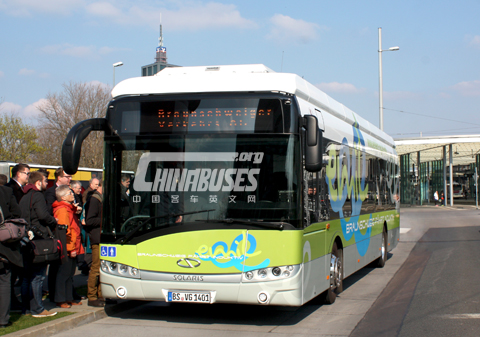The official presentation was organised with the participation of representatives from the German Federal Ministry of Transport and Digital Infrastructure. After a short contactless inductive charge, which only took a couple of minutes, the vehicle set off for its first ride with passengers on board.
The Solaris Urbino 12 electric for Braunschweig is fitted with a system for contactless inductive charging, supplied by Bombardier. It enables the bus to be charged automatically at bus stops thanks to induction coils fitted under the road surface. The whole process is fast, efficient and only takes a few minutes. The implementation of the wireless Primovefast charging system allowed Solaris to equip the bus with small 60 kWh batteries, which save costs and require less space.

In 2014, Solaris will deliver four more inductively charged electric buses to Braunschweig. These will be 18-metre versions fitted with 90 kWh batteries. The Solaris Urbino 18 electric will be the first articulated electric buses produced by Solaris. The operator holds an option for an additional vehicle.
The purchase is part of a research project in Braunschweig on electric mobility via inductive charging called "EMIL", whose aim is to increase the number of inductively charged electric buses. During the first stage of the project, the service on the inner-city circular bus line M19 will be changed over to clean electric operation.
Further orders for Solaris electric buses include two Solaris Urbino 12 electric with conventional plug connections for Düsseldorf. They are fitted with 210 kWh batteries. Both vehicles can be equipped with an automatic system for conductive fast charging mounted on the roof at a later date. This solution was officially presented last year.
A Solaris battery bus was also chosen by the Swedish city of Västerås, which ordered the Solaris Urbino 12 electric with conventional plug connection. Its 160 kWh battery will be divided into four units. Two of them, 40 kWh each, will be placed on the roof, while the remaining two will be installed at the rear of the vehicle. Thanks to this solution, axle loads will be evenly distributed and three additional seats on the rear bench will be added. Additionally, the bus will be equipped with a heater powered by two gas cylinders installed on the roof. The gas heater will extend the operational range of the bus.
With an order from Hamburger Hochbahn for two Solaris Urbino 18.75 electric with fuel cells, Solaris will add a new innovative solution to its product range. The vehicles for Hamburg will be equipped with a 120 kWh battery. They will be longest electric buses produced by Solaris and will use Ballard’s 101 kW fuel cell as a range extender.